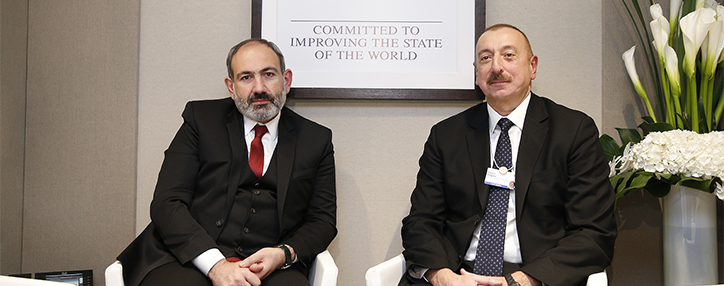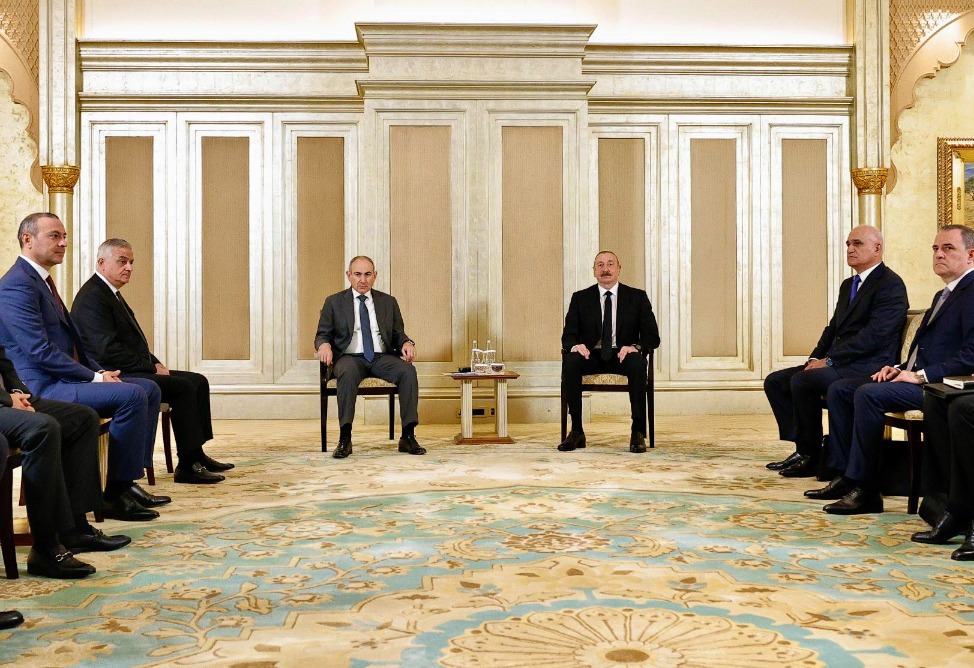Pashinyan speaks about his meeting with Aliyev in Davos
23.01.2019,
17:03
The meeting with the President of Azerbaijan Ilham Aliyev on the sidelines of the World Economic Forum in Davos on January 22 was informal, Armenian Prime Minister Nikol Pashinyan said in a live Facebook broadcast today.

YEREVAN, January 23. /ARKA/. The meeting with the President of Azerbaijan Ilham Aliyev on the sidelines of the World Economic Forum in Davos on January 22 was informal, Armenian Prime Minister Nikol Pashinyan said in a live Facebook broadcast today.
The Armenian leader said the meeting lasted for about 90 minutes. “It was our third meeting. There was no prior agreement, as for the previous meetings,” Pashinyan said.
“Often, at international venues, a situation arises when there is no way to avoid an encounter. And therefore, it was decided that at such events we just should not avoid meetings, and if there is a reason to talk, then we should meet and talk. Moreover, such meetings should not be viewed as official or the start of a large negotiation process," said Pashinyan.
Pashinyan stressed that the meeting with Aliyev in Davos took place precisely by this scenario. ‘The forum organizers inquired about their attitude to the possibility of our meeting. Aliyev and I said we were not against and we met and talked in an informal setting," said Pashinyan.
“As for what was said during our meetings, it was about the history of the negotiation process. Of course, we are also discussing possibilities for the settlement of the conflict (Nagorno-Karabakh), conditions or lack of opportunities for negotiations,” said Pashinyan.
The Prime Minister stressed that no specific details of the negotiations were discussed. There was an exchange of thoughts about the negotiation process and possible contacts.
“I want to emphasize that the key part of the discussions was about what we had stated r openly and publicly earlier,” he said.
At the same time, Pashinyan called unacceptable some comments or statements by various political figures or political scientists about secret talks and even conspiracies.
"I hope that our agreement will not be regarded as a conspiracy. It is absurd to even think about it. All this is due to the wrong perception of the situation," he stressed.
According to the Prime Minister, it’s natural that every head of state, during any meeting or conversation, proceeds solely from the interests of his country and people, and to think about some kind of conspiracy means to incorrectly assess the situation.
The Nagorno-Karabakh conflict erupted into armed clashes after the collapse of the Soviet Union in the early 1990s as the predominantly Armenian-populated enclave of Azerbaijan sought to secede from Azerbaijan and declared its independence backed by a successful referendum.
On May 12, 1994, the Bishkek cease-fire agreement put an end to the military operations. A truce was brokered by Russia in 1994, although no permanent peace agreement has been signed. Since then, Nagorno-Karabakh and several adjacent regions have been under the control of Armenian forces of Karabakh. Nagorno-Karabakh is the longest-running post-Soviet era conflict and has continued to simmer despite the relative peace of the past two decades, with snipers causing tens of deaths a year.
On April 2, 2016, Azerbaijan launched military assaults along the entire perimeter of its contact line with Nagorno-Karabakh. Four days later a cease-fire was reached. -0-
The Armenian leader said the meeting lasted for about 90 minutes. “It was our third meeting. There was no prior agreement, as for the previous meetings,” Pashinyan said.
“Often, at international venues, a situation arises when there is no way to avoid an encounter. And therefore, it was decided that at such events we just should not avoid meetings, and if there is a reason to talk, then we should meet and talk. Moreover, such meetings should not be viewed as official or the start of a large negotiation process," said Pashinyan.
Pashinyan stressed that the meeting with Aliyev in Davos took place precisely by this scenario. ‘The forum organizers inquired about their attitude to the possibility of our meeting. Aliyev and I said we were not against and we met and talked in an informal setting," said Pashinyan.
“As for what was said during our meetings, it was about the history of the negotiation process. Of course, we are also discussing possibilities for the settlement of the conflict (Nagorno-Karabakh), conditions or lack of opportunities for negotiations,” said Pashinyan.
The Prime Minister stressed that no specific details of the negotiations were discussed. There was an exchange of thoughts about the negotiation process and possible contacts.
“I want to emphasize that the key part of the discussions was about what we had stated r openly and publicly earlier,” he said.
At the same time, Pashinyan called unacceptable some comments or statements by various political figures or political scientists about secret talks and even conspiracies.
"I hope that our agreement will not be regarded as a conspiracy. It is absurd to even think about it. All this is due to the wrong perception of the situation," he stressed.
According to the Prime Minister, it’s natural that every head of state, during any meeting or conversation, proceeds solely from the interests of his country and people, and to think about some kind of conspiracy means to incorrectly assess the situation.
The Nagorno-Karabakh conflict erupted into armed clashes after the collapse of the Soviet Union in the early 1990s as the predominantly Armenian-populated enclave of Azerbaijan sought to secede from Azerbaijan and declared its independence backed by a successful referendum.
On May 12, 1994, the Bishkek cease-fire agreement put an end to the military operations. A truce was brokered by Russia in 1994, although no permanent peace agreement has been signed. Since then, Nagorno-Karabakh and several adjacent regions have been under the control of Armenian forces of Karabakh. Nagorno-Karabakh is the longest-running post-Soviet era conflict and has continued to simmer despite the relative peace of the past two decades, with snipers causing tens of deaths a year.
On April 2, 2016, Azerbaijan launched military assaults along the entire perimeter of its contact line with Nagorno-Karabakh. Four days later a cease-fire was reached. -0-



